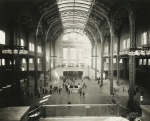Difference between revisions of "Chapter 16"
| Line 44: | Line 44: | ||
'''''nun sò che'''''<br /> | '''''nun sò che'''''<br /> | ||
The Italian phrase meaning "I don’t know what," but it’s used idiomatically to express a vague, indefinable quality, like saying in English, "a certain something" or, in this context, "vibe." | The Italian phrase meaning "I don’t know what," but it’s used idiomatically to express a vague, indefinable quality, like saying in English, "a certain something" or, in this context, "vibe." | ||
| + | |||
| + | ==Page 121== | ||
| + | '''The main concourse at Union Station'''<br /> | ||
| + | [[image:Chicago-Union-Station.jpg|thumb|150px|'''Chicago's Union Station, Grand Hall (Main Concourse), circa 1930’’’|left]] | ||
Revision as of 09:38, 17 October 2025
Page 115
Little Cosenza
a locale, possibly a Pynchon invention, Calabrian-flavored micro-enclave name riffing on real Chicago neighborhoods.
Page 116
"Liberty, out for a stroll [...] around dawn"
Page 117
"Packard Custom Eight limousine [...] no chrome, no wax job, no shine, flat black all over"
"I call it spinach"
1930s slang meaning a sarcastic dismissal, i.e., "I call it nonsense," "I don’t buy it";
Page 118
omertà
Italian: a code of silence and loyalty, especially associated with the Mafia and other criminal organizations in southern Italy and their offshoots in America.
a roscoe he may not be carrying
"roscoe" is American gangster/slang for a gun, most often a handgun (a revolver)
che figata
An informal Italian exclamation meaning roughly "How cool!", "That’s awesome!", or "What a great thing!"
Chazzy's umbatz
In vaudeville, burlesque, and comic radio talk, umbatz was a sound word that turned into an adjective, describing someone wild, excitable, or mentally offbeat — the kind of character who’d make noisy gestures, talk fast, or act manic, like a musical oom-pah caricature come to life.
"miles o' smiles, as it sez in the ads"
"Miles o’ Smiles" was a popular advertising and publicity slogan in the early 1930s — especially tied to the 1933–1934 Chicago World’s Fair, officially known as "A Century of Progress," capturing the cheerful, modern, and escapist tone the fair tried to project during the Great Depression: optimism through technology, entertainment, and American ingenuity.
Page 119
D and D
Drunk and Disorderly? Done and Done?
dance like those Castles do
The Castles dancers refers to the legendary husband-and-wife dance team Vernon and Irene Castle, who were among the most influential figures in American popular dance in the 1910s.
Page 120
gabadost
A sort of mock-Italian slang meaning “a fancy guy,” “a hotshot,” or “somebody full of himself.”
nun sò che
The Italian phrase meaning "I don’t know what," but it’s used idiomatically to express a vague, indefinable quality, like saying in English, "a certain something" or, in this context, "vibe."
Page 121
The main concourse at Union Station


